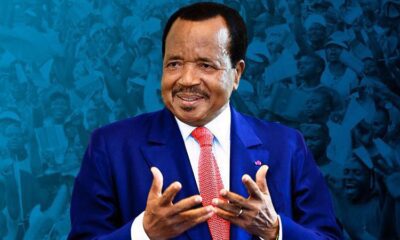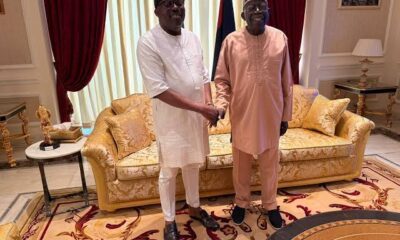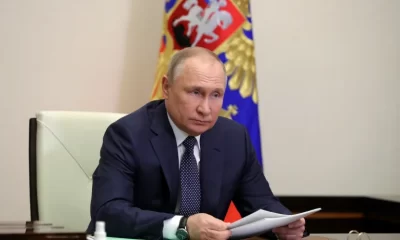Forgotten Dairies
Oshodi Open Door: Reviving Long-Abandoned Cases – A Testament to EFCC’s Determination
President Tinubu, in particular, is gradually playing, hopefully with those around him, a crucial role by fostering an environment that supports the EFCC’s revival efforts. His public stance on the importance of accountability and reforms, coupled with his personal encouragement of institutional independence, signals a shift towards prioritizing the rule of law. Such support strengthens the agency’s ability to act decisively and ensures the message of zero tolerance for corruption reaches all corners of the system.

The Economic and Financial Crimes Commission (EFCC) plays a pivotal role in combating corruption, financial crimes, and money laundering in Nigeria. Established to ensure transparency and accountability, the EFCC investigates, prosecutes, and enforces laws against those who exploit the nation’s wealth for personal gain. In recent years, under its determined leadership, the agency has embarked on a mission to revive long-abandoned corruption cases that involve high-profile individuals across politics, corporate sectors, and public offices.
For instance, the EFCC recently reopened a decade-old case involving prominent political figures accused of diverting public funds. By revisiting such high-stakes matters, the agency has demonstrated its resolve to tackle corruption head-on, regardless of the power or influence of those involved. This bold move has not only reignited public confidence but also highlighted the EFCC’s crucial role in challenging systemic impunity and enforcing the rule of law in Nigeria.
These cases, which have been dormant for over a decade, represent a bold and necessary step to address the culture of impunity that has plagued the nation. By reopening such matters, the EFCC is reaffirming its commitment to the rule of law and the principle that no individual, no matter how influential, is above justice.
The Need for Revival Efforts
For years, Nigeria has grappled with a compromised justice system where high-profile corruption cases have been derailed by delay tactics, procedural loopholes, and systemic inefficiencies. Senior lawyers employ frivolous motions, crooked court registrars manipulate filings, and complicit judges issue rulings that favor powerful defendants. These challenges have created a culture where time and influence often undermine accountability.

Revival efforts by the EFCC directly target these systemic inefficiencies by addressing the mechanisms that have historically allowed cases to stagnate. For example, the EFCC is working closely with judicial stakeholders to streamline court procedures and implement measures that minimize opportunities for delay. The commission has also introduced internal reforms, such as enhancing investigative capabilities through digital forensic tools, which make it harder for individuals to obscure their financial dealings. These advancements ensure that revived cases are supported by robust evidence, reducing the chances of manipulation or dismissal on technical grounds.
Even more troubling is the fact that many individuals with pending corruption cases remain active in positions of power, including members of the legislature, Senate, and executive agencies. Corporate leaders implicated in financial misconduct continue to wield influence, reinforcing a system where justice appears unattainable for the average Nigerian. The decision by the EFCC to revisit these old cases signals a refusal to allow these tactics to triumph over justice. These revival efforts are more than symbolic; they represent a push to confront the systemic issues that have enabled corruption to thrive. Even within a deeply flawed judicial system, the reopening of these cases provides hope for progress and accountability.
Key Strategies to Achieve Revival Success
Under the leadership of its current chairman, the EFCC has taken deliberate steps to ensure the success of its revival efforts, including emphasizing thorough case reviews, countering delay tactics, and fostering collaboration with the judiciary. For instance, the EFCC has intensified its scrutiny of high-profile cases, conducting detailed forensic audits and leveraging digital tools to trace financial irregularities. These proactive measures have enabled the agency to build stronger cases that withstand the procedural defenses often employed by influential defendants.
To combat delay tactics, the EFCC has engaged with judicial bodies to advocate for time-bound trials, ensuring cases are expedited without unnecessary adjournments. An example of this is the renewed focus on legislative collaboration to strengthen anti-corruption laws, thereby closing legal loopholes that enable stalling. Additionally, the commission has worked to establish specialized task forces within its ranks, focused solely on fast-tracking revived cases.
By tackling cases involving high-profile politicians and corporate leaders, the EFCC is demonstrating a commitment to justice that transcends political and social influence. These efforts reinforce the notion that Nigeria can move beyond its troubled history and into an era of accountability, offering tangible proof that systemic change is achievable through consistent action.
Benefits of Reviving Old Cases
The revival of long-dormant cases carries immense benefits for Nigeria, restoring public confidence, setting critical precedents, strengthening institutions, and promoting a culture of accountability. For example, revisiting high-profile cases of corporate embezzlement has the potential to recover misappropriated public funds, which can be redirected toward education and healthcare. Similarly, reopening cases involving political leaders accused of fraud signals a commitment to clean governance and sets a tone of deterrence for future officeholders.
The reopening of these cases reminds Nigerians that no matter how delayed, justice remains possible. When influential figures are held accountable—such as recent cases that led to recovered assets being returned to government coffers—it sends a powerful message that the culture of impunity can be dismantled. By challenging the perception that power equates to immunity, the EFCC is laying the groundwork for a more transparent and equitable society.
Even if only a few cases result in convictions, the impact of holding influential individuals accountable will ripple through the nation, inspiring trust and encouraging reform. These revival efforts signal a new commitment to justice, offering hope to citizens who have long demanded change.
The Role of the EFCC Chairman
The EFCC chairman has shown exceptional courage and determination in spearheading the revival of these long-abandoned cases. His leadership reflects a commitment to integrity, justice, and the belief that no individual or institution should be above the law.
By taking on some of the most challenging and politically sensitive cases in Nigeria’s history, the chairman has demonstrated a willingness to confront entrenched interests and systemic corruption. His efforts to ensure procedural diligence and counter delay tactics reveal his resolve to see justice served, even in the face of immense resistance. His focus on pursuing not only past wrongdoings but also ensuring active officeholders face scrutiny signals a deep understanding of the stakes involved in this battle for Nigeria’s future.
While these efforts are not without challenges, the chairman’s leadership has set a new standard for what the EFCC can achieve. His focus on transparency, accountability, and collaboration with the judiciary is a testament to his vision for a better Nigeria. His boldness inspires hope that systemic change is achievable.
Conclusion
The revival of long-abandoned corruption cases by the EFCC is a watershed moment in Nigeria’s fight against impunity. These efforts reflect not only the agency’s commitment to justice but also its recognition of the broader systemic changes needed to achieve meaningful reform.
While the journey is far from over, the determination of the EFCC chairman and his team provides hope that even in a compromised system, progress is possible. These revival efforts are a call to action for all stakeholders—government, judiciary, and citizens—to support the fight against corruption and demand accountability.
President Tinubu, in particular, is gradually playing, hopefully with those around him, a crucial role by fostering an environment that supports the EFCC’s revival efforts. His public stance on the importance of accountability and reforms, coupled with his personal encouragement of institutional independence, signals a shift towards prioritizing the rule of law. Such support strengthens the agency’s ability to act decisively and ensures the message of zero tolerance for corruption reaches all corners of the system.
The Nigerian people must also remain vigilant and supportive, recognizing that the fight against corruption is a collective responsibility. Let us salute the EFCC chairman and his team for their courage and persistence in reopening cases that many thought were long buried. These efforts remind us that justice, though delayed, is never out of reach.
What is Oshodi Open Door Public Training (OOPDT, pronounced opidt)?
Oshodi Open Door Public Training (OOPDT, pronounced opidt) is an impactful public awareness initiative committed to promoting transparency, accountability, and integrity in Nigeria. Through educational articles and resources, OOPDT seeks to raise awareness about the importance of ethical governance. Additionally, the initiative offers Timely Response Solutions (TRS) training at minimal or no cost, with small compensation provided to the team for their time. This specialized training is designed to address urgent and critical challenges within institutions or among officials, ensuring swift and effective interventions that enhance organizational efficiency and individual performance.
Professor John Egbeazien Oshodi is a distinguished American psychologist, educator, and author, known for his expertise in cross-cultural psychology, forensic/clinical psychology, police and prison science, and social justice. Born in Uromi, Edo State, Nigeria, he is the son of a father who served in the Nigeria Police Force for 37 years.
Professor Oshodi has made significant contributions to forensic psychology, notably introducing it into Nigeria in 2011 through the National Universities Commission (NUC) and at Nasarawa State University. His academic career spans several institutions, including Florida Memorial University, Florida International University, Broward College, and Nova Southeastern University.
He currently serves as a government consultant for forensic-clinical psychological services in the USA, while practicing as a clinical and forensic psychologist. He also holds virtual faculty roles at Walden University, Weldios University, and ISCOM University.
In addition to his academic and professional work, Professor Oshodi has authored numerous publications and public opinion pieces on African governance challenges. He is the founder of the Psychoafricalysis theory in psychology, which has contributed to the field’s development.
Professor Oshodi’s work continues to inspire scholars and practitioners worldwide. He is a former Secretary-General of the Nigeria Psychological Association (NPA), and his contributions have had a lasting impact on both psychology and social justice discourse in Africa.
Professor John Egbeazien Oshodi is a distinguished American psychologist, educator, and author, known for his expertise in cross-cultural psychology, forensic/clinical psychology, police and prison science, and social justice. Born in Uromi, Edo State, Nigeria, he is the son of a father who served in the Nigeria Police Force for 37 years.
Professor Oshodi has made significant contributions to forensic psychology, notably introducing it into Nigeria in 2011 through the National Universities Commission (NUC) and at Nasarawa State University. His academic career spans several institutions, including Florida Memorial University, Florida International University, Broward College, and Nova Southeastern University.
He currently serves as a government consultant for forensic-clinical psychological services in the USA, while practicing as a clinical and forensic psychologist. He also holds virtual faculty roles at Walden University, Weldios University, and ISCOM University.
In addition to his academic and professional work, Professor Oshodi has authored numerous publications and public opinion pieces on African governance challenges. He is the founder of the Psychoafricalysis theory in psychology, which has contributed to the field’s development.
Professor Oshodi’s work continues to inspire scholars and practitioners worldwide. He is a former Secretary-General of the Nigeria Psychological Association (NPA), and his contributions have had a lasting impact on both psychology and social justice discourse in Africa.










